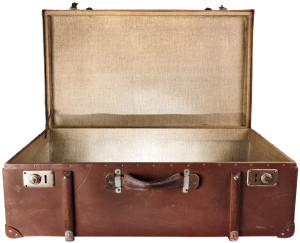About 24 years ago I started bringing a suitcase full of odd props to schools and libraries all over the world. When a child chose the turtle, I would read my poem “Dad” from Good Luck Gold; when she chose the noodles, I would read my poem “Noodles.” A snake, a baby’s shoe: different children were intrigued by different items, and all were eager to match poems and props.

Why a Poetry Suitcase?
A suitcase takes you places—new, exciting, vacation spots, places you want to visit. You could use a box, but a box is for hidden storage. How many times have you put something in a box, and forgotten about it?
What do you take in your suitcase? The things you need most. Favorite things. We need to think of poems as necessary, favorite things.
Creating a Poetry Suitcase
Spread out poetry books (or poems), enough so each child can choose one book (or poem) and there will still be leftovers.
Ask each child to choose one poem to copy on an index card; you can have them do it in class, or give it as a homework assignment.
Give each child one week to bring in a prop tied to their poem. The prop can be as simple as a leaf, an old toy, a photo or a drawing.
Soon you will have a Poetry Suitcase full of poems and intriguing props!
When a child chooses a poem on her own and then copies it:
—the child sees firsthand how varied poems can be
—the child develops a better sense of what she likes in poetry
—the child comes to own that poem by copying it
Sharing Your Poetry Suitcase
At the beginning of class—whether you’re in person or doing remote learning—or five minutes before the end of the day, ask a child to choose a prop from the suitcase.
Read the poem that goes with the prop.
Reading a poem will take less than thirty seconds, on average. Don’t analyze the poems, though it is fine to talk about them briefly. Reading three or four poems will take just two minutes! You can finish by selecting a prop out of the suitcase yourself—one that ties into a subject that you might be exploring that day.
—Props make a child curious and eager to hear the poems.
—Having poems tied to props gives immediate gratification.
—Children want to browse through the suitcase in a meaningful way.
Keeping Your Suitcase Fresh
When your suitcase is “used up,” you can ask children to write poems of their own to go with different props. Or, when the suitcase is really used up—or really full of treasures—you can trade it with another classroom, library, or family!

Leave a Reply
Want to join the discussion?Feel free to contribute!